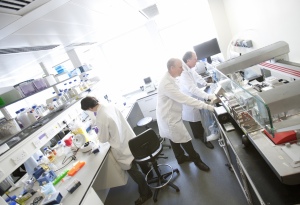Synthetic biology success as Imperial experts win prestigious award

Two Imperial researchers have been recognised for their leadership in synthetic biology with their SynbiCITE centre at the Engineering Biology Awards.
The awards were given at the SynBioBETA Conference in San Francisco. SynBioBETA CEO John Cumbers presented individual awards to Professor Richard Kitney from the Department of Bioengineering, and Professor Paul Freemont from the Department of Medicine, for their contributions to and excellence in synthetic biology.
Professor Kitney and Professor Freemont were recognised by the

SynBioBETA Awards Committee for founding and directing the UK's national industrial translation centre for synthetic biology, SynbiCITE.
SynbiCITE is an Imperial College London based centre that combines biology and engineering to create synthetic biology for biosensors, biomaterials, biosynthesis, bioprocessing and metabolic and genetic engineering.
The committee also recognised the importance of the professors' work in the strategic development of the area over many years.
Cumbers said: “The field of synthetic biology has made incredible strides in enabling life-saving technologies and applications that will improve our world.”
Bio beginnings
SynbiCITE provides a bridge between academia and industry to speed up the development of new technologies in synthetic biology. This is a field of science where researchers re-engineer cells to develop microscopic devices that can be used to address a range of global challenges such as producing low-carbon fuel, reducing the cost of industrial raw materials and producing new pharmaceuticals.

SynbiCITE is a national
resource for universities across
the country
Their work began with Professor Kitney chairing The Royal Academy of Engineering’s Inquiry and Report in 2009 which Professor Freemont co-wrote. Professor Kitney is also a member of the Government’s Leadership Council for Synthetic Biology, of which Professor Freemont is a member.
SynbiCITE now works with over 20 UK universities, 10 multinationals and over 30 startups. SynbiCITE has been responsible for supporting the development of startups in three ways: by funding proof-of-concept and development projects, providing detailed technical support and equipment to companies, and by providing business education.
Companies that have received significant support from SynbiCITE include LabGenius, CustoMem, Prokarium and Synthace, all of which have now received significant investment from the private sector.
In October, SynbiCITE was re-funded for a further five years and is now called SynbiCITE 2.0.
SynBioBETA
SynBioBETA is the world's leading conference for business, industry and investment in the field in synthetic biology. This year’s conference was attended by almost one thousand people from the United States and internationally. The meeting focuses, primarily, on the development of industrial applications in synthetic biology with nearly one billion dollars’ worth of investment in synthetic biology companies in the last year.
Over £500 million has now been invested in synthetic biology companies in the UK, with around 120 startups in existence (second only to the United States). Private sector investment in the field is now rapidly increasing worldwide, with significant international inward investment.
Article text (excluding photos or graphics) © Imperial College London.
Photos and graphics subject to third party copyright used with permission or © Imperial College London.
Reporter
Caroline Brogan
Communications Division